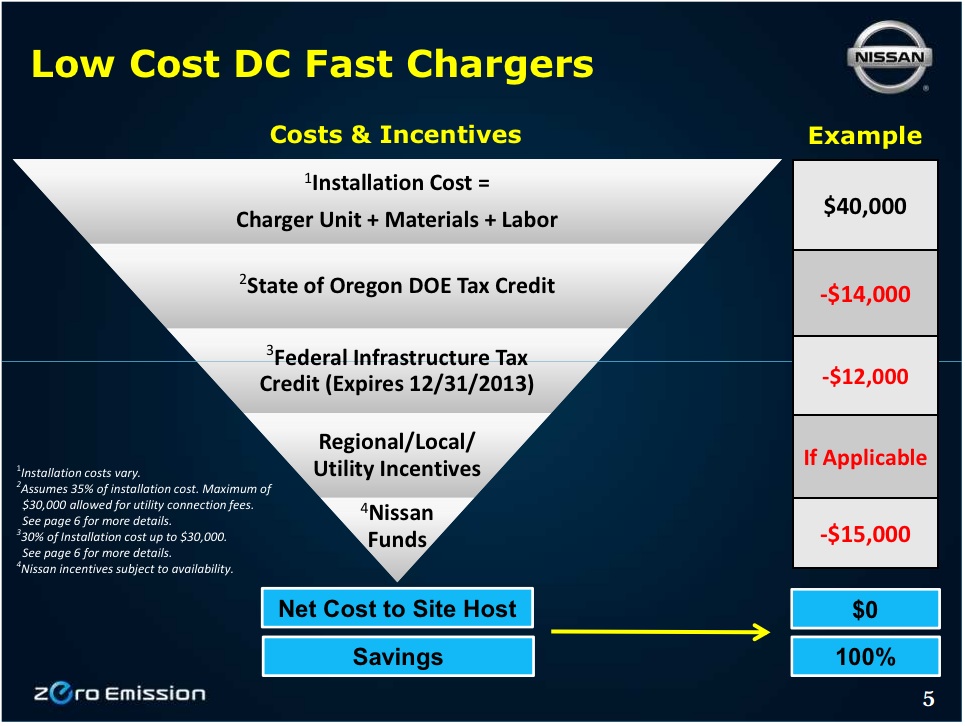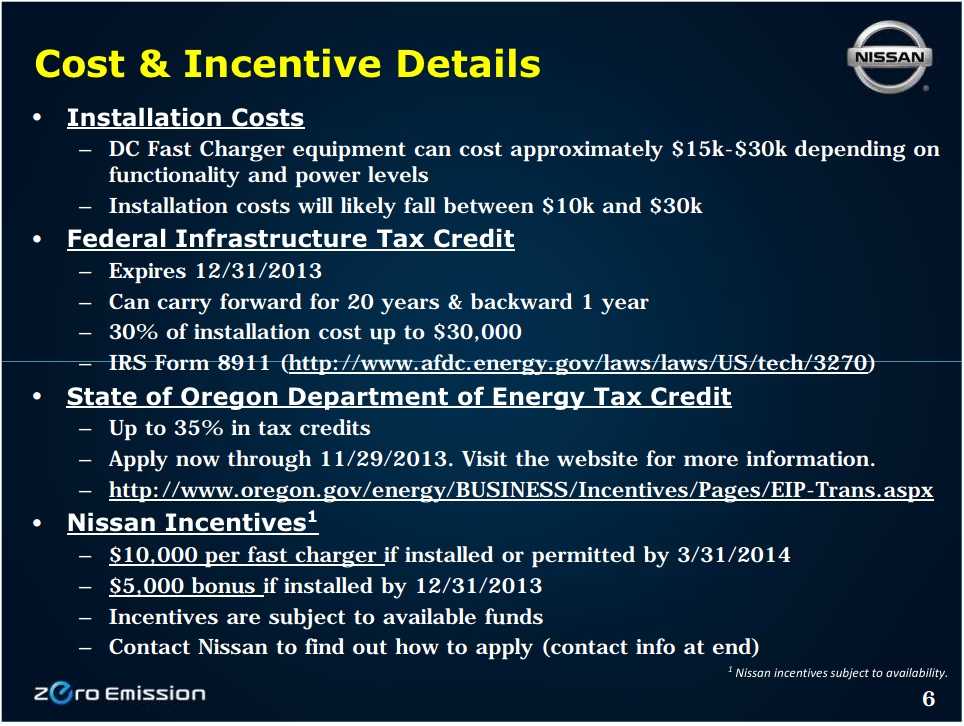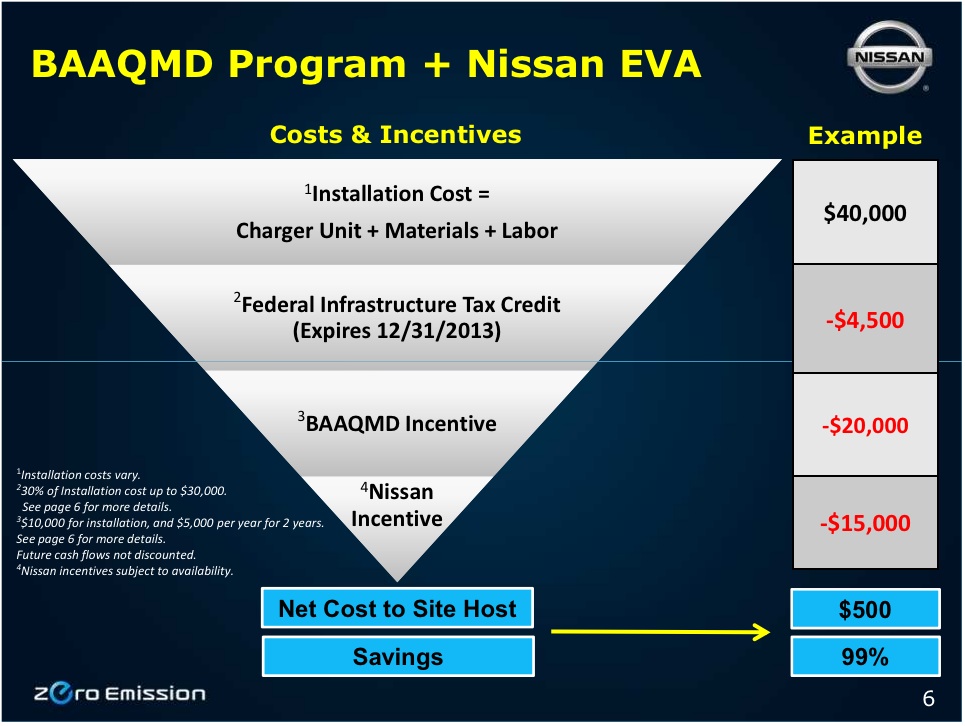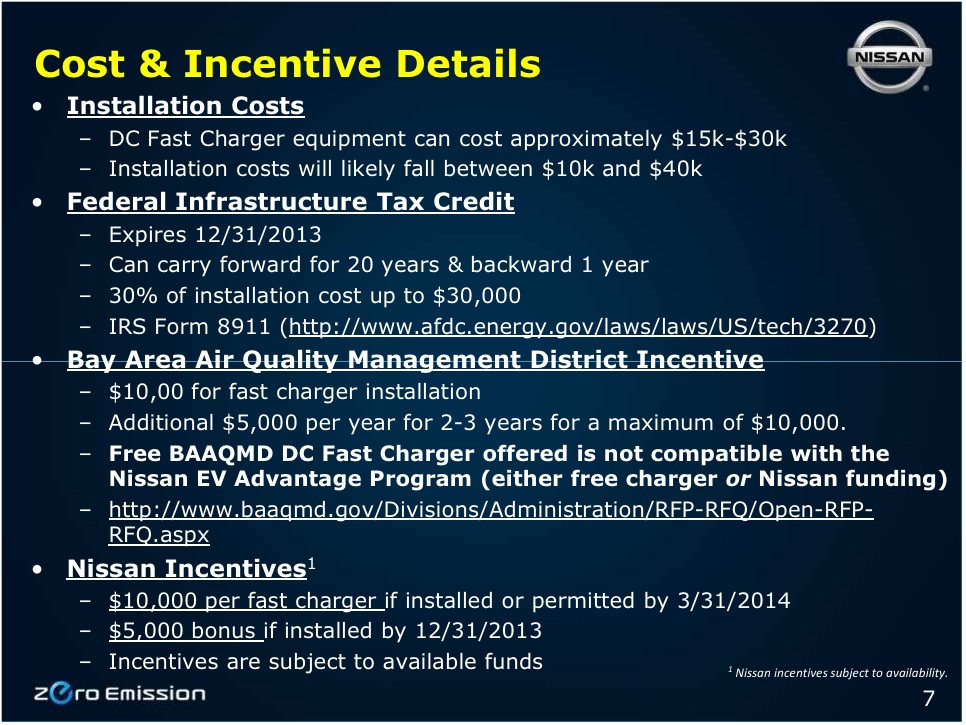In late 2013, Nissan started funding CHAdeMO charger installation across the US as part of a larger plan to rapidly expand CHAdeMO infrastructure.
Nissan, and the Japanese automakers, are continuing to press forward on CHAdeMO adoption despite the fact that the SAE and European automakers have chosen the SAE Combo Charging System. Throughout 2013 the company has been working on rapidly deploying CHAdeMO charging stations, largely through Nissan dealerships. In the Fall of 2013 it became known that Nissan was directly subsidizing CHAdeMO charging station installation.
In January 2013, Nissan announced a plan to build lots of CHAdeMO charging stations at Nissan dealerships around the country
![]() . Nissan has a history of standing firm with their commitment to CHAdeMO. For example, at a California State Senate hearing convened by State Sen. Ellen Corbett, GM’s Shad Balch and a Nissan Representative traded barbs over fast charging station standards
. Nissan has a history of standing firm with their commitment to CHAdeMO. For example, at a California State Senate hearing convened by State Sen. Ellen Corbett, GM’s Shad Balch and a Nissan Representative traded barbs over fast charging station standards , with the Nissan person pushing for CHAdeMO adoption.
, with the Nissan person pushing for CHAdeMO adoption.
Speaking at a meeting of the Golden Gate Electric Vehicle Association, Tim Gallagher, Nissans Western US Manager of Corporate Communications said “I can finally say that I’m confident that in the next 60 days, we’re going to have a lot of Quick Chargers in the ground, that we’re doing with our dealerships. I’ve seen the list of dealerships that have been identified that will get Quick Chargers. It’s great coverage throughout the state. It’s sort of a test program for us, because we want to see about usage. But if I were here in 60 days, we would be having a lot different conversation about a lot of Nissan Chargers in the ground.” It wasn’t in Nissan’s original planning to get into the business of deploying quick charging stations. “Three or four years ago, it was not part of the business plan to do our own Quick Chargers, because we thought the community would already be up and running. But a couple of years ago we decided to jump in and do our own. We lowered the cost of it.”
Shortly after Gallagher spoke to the GGEVA, Nissan’s corporate communications released a bigger plan![]() that would deploy at least 500 fast charging stations across the U.S. over the next eighteen months from January 2013. Nissan said, at the time, the U.S. has about 160 fast charging stations, all of which are CHAdeMO, but none of which were in the Washington DC area. One part of the announcement was a deal with NRG to install some eVgo Freedom Stations in the Washington DC area. Nissan’s three-pronged strategy for increasing fast charging network infrastructure works through Nissan dealerships, workplace charging, and a third venue Nissan describes as “opportunities within local neighborhoods that help interconnect communities where drivers spend the bulk of their time and do the majority of their driving.”
that would deploy at least 500 fast charging stations across the U.S. over the next eighteen months from January 2013. Nissan said, at the time, the U.S. has about 160 fast charging stations, all of which are CHAdeMO, but none of which were in the Washington DC area. One part of the announcement was a deal with NRG to install some eVgo Freedom Stations in the Washington DC area. Nissan’s three-pronged strategy for increasing fast charging network infrastructure works through Nissan dealerships, workplace charging, and a third venue Nissan describes as “opportunities within local neighborhoods that help interconnect communities where drivers spend the bulk of their time and do the majority of their driving.”
“We envision a quick-charging network that links communities and neighborhoods where people live, work, shop and socialize,” said Brendan Jones, Nissan’s director of electric vehicle marketing and sales strategy. “Having a robust charging infrastructure helps build range confidence, which boosts interest in and use of electric vehicles. By improving the charging infrastructure, Nissan furthers its commitment to bringing electric vehicles to markets throughout the United States.”
In July 2013, Nissan said![]() they were ready to go from a 24-dealer pilot program to a larger deployment of 100 CHADEMO stations nationwide in 21 key markets. “Nissan is undertaking a proactive, multi-pronged approach to expand charging infrastructure to enhance awareness of electric cars like the LEAF and instill range confidence in potential customers. We know that available charging infrastructure opens the doors for more Nissan LEAF sales.” The 24-dealer pilot program was rolled out at dealerships in the markets of San Francisco, Los Angeles, San Diego, Sacramento and Seattle. It allowed Nissan to study the frequency of use for the chargers and the impact that charging has on the dealer’s operations. Initial data announced at that time showed that over 5,600 fast charging sessions, each location was used for an average of 4.5 sessions a day.
they were ready to go from a 24-dealer pilot program to a larger deployment of 100 CHADEMO stations nationwide in 21 key markets. “Nissan is undertaking a proactive, multi-pronged approach to expand charging infrastructure to enhance awareness of electric cars like the LEAF and instill range confidence in potential customers. We know that available charging infrastructure opens the doors for more Nissan LEAF sales.” The 24-dealer pilot program was rolled out at dealerships in the markets of San Francisco, Los Angeles, San Diego, Sacramento and Seattle. It allowed Nissan to study the frequency of use for the chargers and the impact that charging has on the dealer’s operations. Initial data announced at that time showed that over 5,600 fast charging sessions, each location was used for an average of 4.5 sessions a day.
Nissan EV Advantage Program![]() — Briggs Nissan’s blog post describing the program. They say Nissan “is now offering to foot part of the bill for companies or organizations that install a quick-charging EV station outside of their doors” so long as it’s a CHAdeMO station. Companies doing so by the end of 2013 will recieve a $15,000 subsidy from Nissan. Or, if it’s installed by March 31, 2014, Nissan will fund $10,000 of the cost.
— Briggs Nissan’s blog post describing the program. They say Nissan “is now offering to foot part of the bill for companies or organizations that install a quick-charging EV station outside of their doors” so long as it’s a CHAdeMO station. Companies doing so by the end of 2013 will recieve a $15,000 subsidy from Nissan. Or, if it’s installed by March 31, 2014, Nissan will fund $10,000 of the cost.
The total cost of installation is roughly $40,000 which covers the materials, labor and the charging unit itself. With the EV Advantage Program and federal tax credit, $27,000 of that cost is covered, leaving companies to pay only $13,000 of installation costs.
Nissan Offers $15,000 For New Electric-Car Quick Chargers By Dec 31![]() – December 31 is also when a Federal Alternative Fuel Infrastructure tax credit
– December 31 is also when a Federal Alternative Fuel Infrastructure tax credit![]() expires, so there’s a double incentive to get CHAdeMO stations up and running by the end of the year.
expires, so there’s a double incentive to get CHAdeMO stations up and running by the end of the year.
Oregon
California











